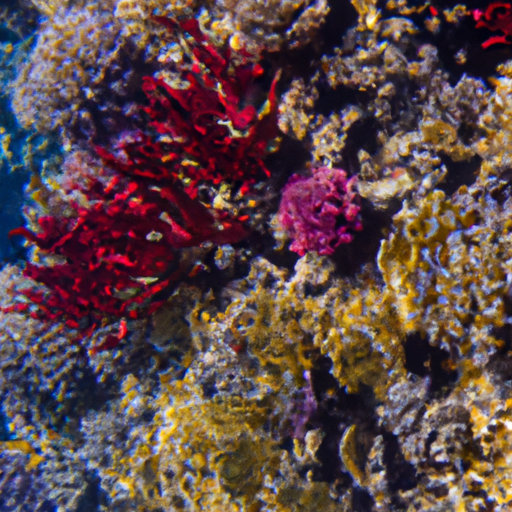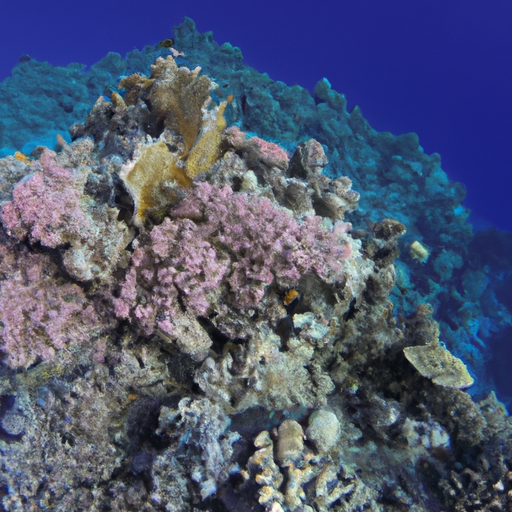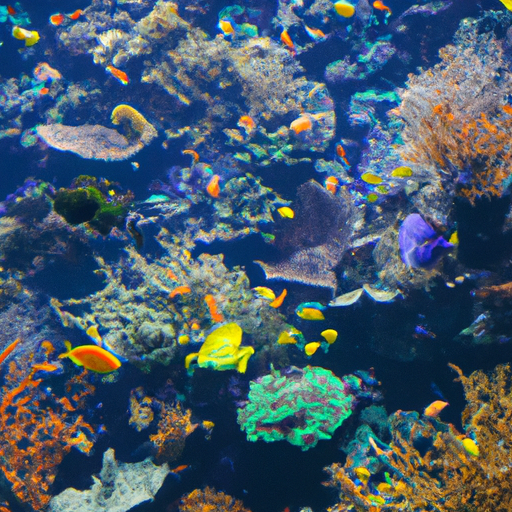
Exploring the Depths: Unraveling the Wonders of Marine Ecosystems
The world’s oceans are home to a vast and diverse array of marine life, with countless species yet to be discovered and understood. There is still so much to learn about the mysteries of the sea, and scientists and researchers are continuously unveiling new and fascinating discoveries about marine ecosystems.
One of the most extraordinary aspects of marine life is its incredible adaptability to the challenging and ever-changing conditions of the ocean. From the deepest trenches to the shallowest coral reefs, marine organisms have evolved unique strategies to survive and thrive in their environments.
In recent years, technological advancements have allowed scientists to explore and study previously inaccessible areas of the ocean. Remotely operated vehicles (ROVs) and autonomous underwater vehicles (AUVs) equipped with high-definition cameras and sensors have enabled researchers to capture stunning imagery of deep-sea creatures and their habitats. These images have provided valuable insights into the intricate webs of life that exist in the depths of the ocean.
One of the most fascinating discoveries in recent years is the existence of hydrothermal vents, deep-sea hot springs that support unique ecosystems. These vents release hot, mineral-rich water into the surrounding ocean, creating a chemical-rich environment that sustains a variety of unusual organisms. These organisms, known as extremophiles, have adapted to survive in extreme temperatures and high-pressure conditions, challenging our understanding of what is necessary for life to exist.
Researchers have also made significant progress in understanding the role of marine biodiversity in maintaining healthy ecosystems. It is now widely recognized that healthy coral reefs, for example, are not only spectacularly beautiful but also serve as crucial habitats for countless marine species. The intricate relationships between corals, fish, and other organisms form complex food webs that support the overall health of the coral reef ecosystem.
Furthermore, studying marine ecosystems has shed light on the impact of human activities on the oceans. Overfishing, pollution, and climate change are all taking a toll on marine life, leading to the decline of certain species and the degradation of ecosystems. By studying the effects of these activities, scientists hope to develop effective conservation strategies to protect and restore marine biodiversity.
In conclusion, the exploration of marine ecosystems continues to reveal fascinating discoveries and insights into the wonders of marine life. From the depths of the ocean to the planet’s most vibrant coral reefs, researchers are uncovering the secrets of marine organisms and their environments. With ongoing research and conservation efforts, we can ensure a sustainable future for these remarkable ecosystems.
Hidden Treasures: Astonishing Discoveries in Marine Biology
Unveiling the Secrets of Marine Life: Fascinating Discoveries and Research
The vast depths of the ocean have always held an air of mystery, captivating scientists and explorers with the promise of hidden treasures waiting to be discovered. In recent years, advancements in technology and research techniques have allowed marine biologists to delve deeper into these unexplored realms, unveiling a wealth of astonishing discoveries and shedding light on the wonders of marine life.
One such remarkable discovery is the existence of deep-sea thermal vents, also known as hydrothermal vents. These underwater geysers spew forth mineral-rich water heated by the Earth’s core. Despite the extreme conditions, scientists have discovered thriving ecosystems surrounding these vents, featuring unique and previously unknown species. These creatures, adapted to survive in the absence of sunlight and under immense pressure, have challenged our understanding of life on Earth.
Another captivating revelation in marine biology research is the discovery of bioluminescent organisms. These organisms, capable of producing their own light, transform the deep sea into a mesmerizing display of glowing colors. From the enchanting glow of delicate jellyfish to the eerie shimmer of deep-sea anglerfish, these adaptations serve various purposes, including attracting prey, camouflaging from predators, and communication.
The study of marine biology has also led to the discovery of immense coral structures, such as the Great Barrier Reef. These underwater ecosystems, often referred to as “the rainforests of the sea,” support a staggering variety of marine life and provide crucial habitats for countless species. However, climate change and human activities threaten their existence, emphasizing the importance of ongoing research and conservation efforts.
Furthermore, recent research has unveiled the remarkable intelligence and social behavior of marine mammals, such as dolphins and whales. These creatures exhibit complex communication systems, remarkable problem-solving abilities, and even display empathy towards one another. Understanding these behaviors not only deepens our appreciation for these magnificent creatures but also raises important ethical questions regarding their treatment and conservation.
The discoveries and advancements in marine biology research continue to astound and captivate scientists and nature enthusiasts alike. By unveiling the secrets of marine life, we gain valuable insights into our own planet’s biodiversity and the interconnectedness of all living things. As technology continues to improve, who knows what other astonishing discoveries await us in the enigmatic depths of the ocean.
Unveiling the Mysteries of Marine Life: Cutting-Edge Research and Breakthroughs
Unveiling the Secrets of Marine Life: Fascinating Discoveries and Research
The Earth’s oceans cover more than 70% of the planet’s surface, making them a vast and unexplored frontier. For centuries, scientists and researchers have been captivated by the mysteries that lie beneath the waves, eager to uncover the secrets of marine life. Thanks to cutting-edge research and breakthrough technologies, we are now witnessing fascinating discoveries and gaining a deeper understanding of the marine world.
One significant area of study in marine biology is the exploration of the deep sea. With the help of remotely operated vehicles (ROV) and submersibles, scientists have been able to dive to incredible depths, uncovering a wealth of new organisms that were previously unknown to science. These deep-sea dwellers, such as the elusive anglerfish and the bioluminescent vampire squid, have captivated both researchers and the general public alike.
Another remarkable breakthrough in marine research is the use of advanced genetic techniques to reveal the intricate relationships between different species and their environments. The field of environmental DNA (eDNA) analysis allows scientists to identify and monitor marine organisms by collecting and analyzing traces of their DNA in water samples. This non-invasive method has opened up new avenues for studying marine ecosystems and understanding the impact of human activities on these fragile environments.
The study of marine animal communication has also yielded exciting discoveries. Whales, dolphins, and other marine mammals are known for their complex vocalizations, which play a crucial role in their social interactions and survival. Through the development of underwater microphones and acoustic monitoring systems, researchers are now able to record and analyze these unique vocalizations, deciphering their meanings, and gaining insight into the behavior of these incredible creatures.
In recent years, technological advancements have greatly enhanced our ability to explore and understand the vastness of the marine world. Autonomous underwater vehicles (AUVs) equipped with high-resolution cameras and sensors have enabled scientists to map and study underwater ecosystems with unprecedented detail. From coral reefs teeming with life to underwater volcanoes that shape the landscape, these tools have revolutionized our understanding of marine environments.
As our knowledge of marine life continues to expand, so does our appreciation for the interconnectedness of our planet’s ecosystems. Protecting and preserving these fragile habitats has become not only a scientific imperative but also a global responsibility. Through ongoing research and collaborative efforts, we can ensure the long-term survival of marine life and maintain the delicate balance of our oceans.
In conclusion, the exploration of marine life has led to fascinating discoveries and breakthroughs in recent years. From the depths of the ocean to the complexities of marine communication, cutting-edge research is shedding light on the mysteries of the marine world. By investing in further research and conservation efforts, we can continue to unveil the secrets of this mesmerizing realm and deepen our understanding of our blue planet.
Guardians of the Sea: Protecting and Preserving Marine Biodiversity
The world’s oceans are home to a diverse array of marine life, but much of it remains a mystery to scientists. However, thanks to ongoing research and technological advancements, we are gradually unveiling the secrets of marine life and gaining a deeper understanding of the incredible biodiversity that exists beneath the sea.
One of the most fascinating aspects of studying marine life is the discovery of new species. In recent years, numerous previously unknown species have been identified, ranging from tiny plankton to massive deep-sea creatures. These discoveries highlight the sheer complexity and diversity of marine ecosystems.
One such remarkable discovery is the existence of deep-sea hydrothermal vents. These vents, found in the depths of the ocean, are home to a unique ecosystem that is not dependent on sunlight. Scientists have discovered various species around these vents that are adapted to survive in the extreme conditions, including high pressures, darkness, and extreme temperatures. These findings not only provide valuable insights into the adaptability of marine life but also have potential applications in fields such as medicine and biotechnology.
Technology plays a crucial role in uncovering the secrets of marine life. Advanced underwater cameras and remotely operated vehicles (ROVs) allow scientists to explore the ocean depths and capture high-resolution images and videos of marine organisms in their natural habitat. This has led to numerous captivating discoveries, including previously unseen behaviors and interactions among different species.
Another area of research that is shedding light on marine biodiversity is DNA analysis. By studying the DNA of various marine organisms, scientists can determine their genetic relationships and better understand their evolutionary history. This information is essential for effective conservation strategies and management of marine resources.
Understanding the intricacies of marine ecosystems is vital for their preservation and conservation. By unraveling the mysteries of marine life, scientists can identify vulnerable species, assess the impact of human activities on marine environments, and develop strategies to protect and restore these fragile ecosystems.
In conclusion, ongoing research and technological advancements are gradually unveiling the secrets of marine life. From the discovery of new species to the exploration of unique ecosystems, each revelation brings us closer to fully understanding the incredible biodiversity that exists below the surface of the world’s oceans. By continuing to invest in research and conservation efforts, we can ensure the protection and preservation of our guardians of the sea.



